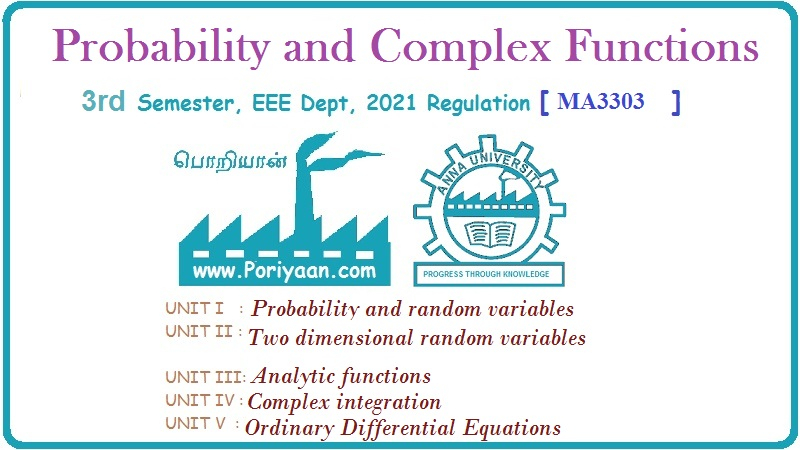Probability and complex function: Unit III: Analytic functions
Analytic functions - necessary and sufficient conditions for analyticity in cartesian and polar co-ordinates
A function is said to be analytic at a point if its derivative exists not only at that point but also in some neighbourhood of that point.
ANALYTIC FUNCTIONS - NECESSARY AND SUFFICIENT CONDITIONS FOR
ANALYTICITY IN CARTESIAN AND POLAR CO-ORDINATES
(a) Analytic [or]
Holomorphic [or] Regular function
[A.U
A/M 2019 R-13]
A
function is said to be analytic at a point if its derivative exists not only at
that point but also in some neighbourhood of that point.
[or]
A
function f (z) which is single-valued and possesses a unique derivative with
respect to z at all points of a region R, is called an analytic or a regular
function of z in that region.
Note
(i)
The synonyms for analytic are holomorphic and regular.
(b) Entire function: [Integral function]
A
function which is analytic everywhere in the finite plane is called an entire
function.
An
entire function is analytic everywhere except at z = ∞.
Example:
e2, sin z, cos z, sinh z, cosh z
(i)
The necessary condition for f (z) to be analytic [Cauchy - Riemann Equations]
[A.U
D15/J16 R-08]
The
necessary conditions for a complex function f(z) = u(x, y) + iv (x, y) to be
analytic in a region R are ∂u/∂x = ∂v/∂y and ∂v/∂x = - ∂u/∂y i.e., ux
= vy and vx = - uy
[OR]
Derive
C R equations as necessary conditions for a function w = f (z) to be analytic.
[Anna, Oct. 1997] [Anna, May 1996]
Proof
:
Let fz) = u(x, y) + iv (x, y) be an analytic function at the point z in a region
R. Since f (z) is analytic, its derivative f' (z) exists in R

The
above equations are known as Cauchy - Riemann equations or C-R equations.
Note
(ii)
The above conditions are not sufficient for f (z) to be analytic. The
sufficient conditions are given in the next theorem.
(ii)
Sufficient conditions for f (z) to be analytic.
If
the partial derivatives ux, uy, V, and vy are all continuous in D and Ux = Vy
and uy = -Vx, then the function f (z) is analytic in a domain D.
(iii)
Polar form of CR equations
In
Cartesian co-ordinates any point z is z = x + iy.
In
polar co-ordinates, z = reiθ where r is the modulus and θ is the argument.

Probability and complex function: Unit III: Analytic functions : Tag: : - Analytic functions - necessary and sufficient conditions for analyticity in cartesian and polar co-ordinates
Related Topics
Related Subjects
Probability and complex function
MA3303 3rd Semester EEE Dept | 2021 Regulation | 3rd Semester EEE Dept 2021 Regulation
